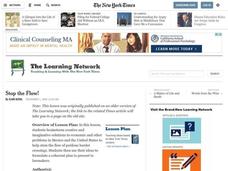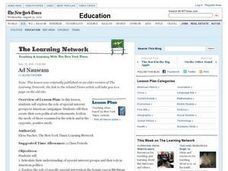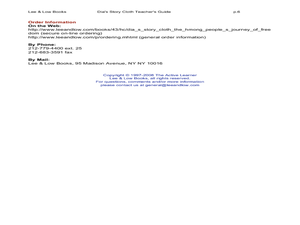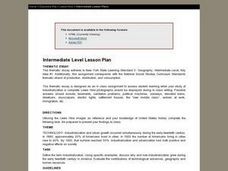National Endowment for the Humanities
Albert Sabin and Bioethics: Testing at the Chillicothe Federal Reformatory
Do the ends justify the means? Getting a drug approved in the US is a long and involved process. But at some point out, it involves testing on humans. The ethics of such testing is the focus of a resource that uses Dr. Albert Sabin's...
Museum of Tolerance
Cultural Research Activity
Class members explore cultural diversity through a variety of texts that showcase the importance of traditions. Then, they interview their family members to research their own cultural background and write their findings on quilt pieces....
Museum of Tolerance
Oral History Activity
Oral history has brought a multitude of lessons, stories, and factoids to our current knowledge of the past. Let us continue to use oral history traditions through a lesson that encourages pupils to discover and appreciate where they...
National Constitution Center
Creating Your Own Town Hall Poster
Middle and high schoolers are walking into a world rife with strong political viewpoints and vocal opinions. Help to prepare them for controversial discussions with a lesson in which they choose, research, and learn more about a...
Penguin Books
The Jungle
It's a jungle out there! Teachers gain information to guide learners through reading The Jungle by Upton Sinclair. Instructors give an overview of the characters in the story and a summary of each chapter. The resource includes questions...
Curated OER
What Does It Mean To Be a Good Citizen?
Students study citizenship and what it means to be a good sitizen. They create their own country and determine its citizenship rules. They work together to create a visual representation of what makes a good citizen.
Alabama Department of Archives and History
Marketing a Bad Idea: Why So Many People Joined the Klan in the 1920s
How did the Klu Klux Klan manage to gain so many members during the 1920s? Class members examine Klan documents and promotional materials to gain an understanding of the propaganda techniques used to attract members.
Illinois State University
Tragedy, Triumph, or Trespass?
Did westward expansion really live up to the dream of adventurers for a new life and opportunities for land and resources? While designed for a flipped classroom, try using this resource to evaluate primary sources alongside your class!...
Curated OER
Bystanders in the Holocaust
High schoolers recognize effects of apathy and indifference, examine behaviors associated with obedience, conformity, and silence, and explore legal responses to issues raised by the Holocaust.
Curated OER
Stop the Flow!
Students brainstorm creative solutions to economic problems in Mexico and the US to help stem the flow of perilous border crossings. They formulate a coherent plan to present to lawmakers.
Curated OER
Children in the Fields
Fourth graders research Hispanic child labor in California's agricultural period. They create dioramas reflecting the lives of migrant farm workers and political cartoons as produce crate labels, They illustrate farm scenes and hold a...
Curated OER
Civil Rights through Photographs
Students examine why racial tensions continued after laws were put into place to try and create equal treatment. In this two part Civil Rights lesson, students explored the causes of the movement through photography and a PowerPoint...
Curated OER
Ad Nauseam
Students explore the role of special-interest groups in American campaigns. They create their own political advertisements.
Curated OER
Constructing Narrative from the Migrant Experience in Literature
Excerpts from John Steinbeck's The Grapes of Wrath and from John Fante's Ask the Dust, as well as a variety of primary source documents provide the background for an examination of the migrant experience from 1920-1945.
Curated OER
Introduction to Selected Documents from the Roxcy Bolton Collection
Young scholars listen to a guided imagery exercise that takes them back to 1969. They brianstorm ideas to try to discover why they would not be allowed to sit at an empty table at a Burdines lunch counter in 1969.
They read letters...
Curated OER
Settling the Plymouth Colony
Students label blank maps with the names of the New England Colonies. They explain the difficulties that the Pilgrims had and how hard they worked to survive in Plymouth.
Curated OER
Freedom from Oppression
Students investigate instances of genocide and role play as reporters writing news stories and editorials.
Curated OER
Chief Justice Roberts Goes to Court
Students gain an introductory into the branches of government. Students research all parts of government and use Frames to create a public service announcement to teach others the parts of government and how they work.
Curated OER
The Active Learner: "Dia's Story Cloth" Literature Guide
Students discuss pre-reading focus questions and complete a KWL chart. In this language arts lesson plan, students mark passages or words they are unsure of with post-it notes to discuss later and answer comprehension questions after...
Curated OER
JAPAN, IMAGES A PEOPLE
Students interpret Japanese and American paintings; evaluate paintings as sources of cultural and historical information
Curated OER
On the Line
Students view a television program that traces the use of the assembly line in mass production and the subsequent conflict between workers' rights and management. They analyze and discuss the portrayal of the American worker over time...
Curated OER
Lewis Hine
Middle schoolers define the term Industrialization. They use specific examples, discuss why and how industrialization grew during the early twentieth century in America. Students evaluate the contributions of technological advances,...
Curated OER
The History of Rock and Roll: Part 8 - The 70's Have a Nice Day - Lesson 2
Students identify the characteristics and elements of large scale rock productions. They examine the similarities between the American Vaudeville shows and the large-scale rock theater productions of the 1970's.
Teaching Tolerance
The Power of Words: Ethnic Stereotypes
Pupils study stereotypes that are associated with different ethniciites or regional groups. They examine how occupations can be hypothetically related to ethnic sounding names.

























